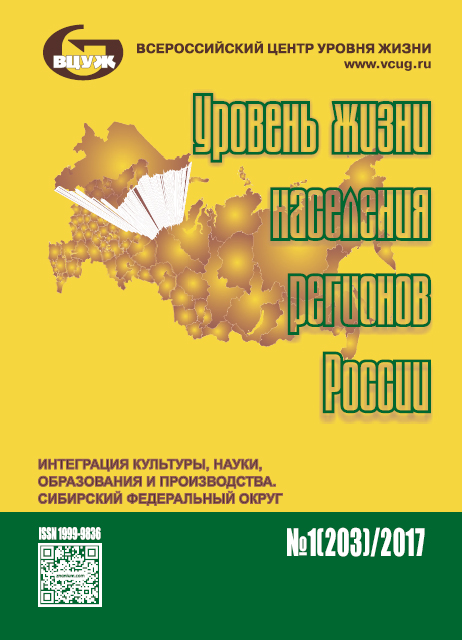Регулирование рынка труда и занятости населения в условиях развития информационно-коммуникационных технологий
Научная статья
Для цитирования
Локтюхина Н. В., Новикова И. В. Регулирование рынка труда и занятости населения в условиях развития информационно-коммуникационных технологий // Уровень жизни населения регионов России. 2017. Том 13. № 1. С. 40-49.
Аннотация
Объект. Рынок труда и занятости населения России в условиях развития информационно-коммуникационных технологий (ИКТ).
Предмет. Социально-экономические отношения по поводу регулирования рынка труда и занятости населения России в условиях развития ИКТ.
Содержание статьи. В работе рассматриваются актуальные направления регулирования рынка труда и занятости населения, обусловленные развитием ИКТ: адаптация рынка труда и системы подготовки кадров к изменению мира профессий, регулирование труда высокомобильных работников, снижение рисков неустойчивой занятости посредством изменений законодательства, внедрение ИКТ в сферу государственного регулирования рынка труда. Цель. Разработка предложений по политике на рынке труда и сфере занятости населения в условиях развития ИКТ.
Ключевые слова:
рынок труда, занятость населения, регулирование занятости населения, государственная политика занятости, трудовое законодательство, информационно-коммуникационные технологии
Литература
1. Авраамова Е.М., Каравай А.В., Клячко Т.Л., Логинов Д.М. Мониторинг дополнительного профессионального образования в России / Е.М. Авраамова, А.В. Каравай, Т.Л. Клячко, Д.М. Логинов. – М: Издательский дом «Дело» РАНХиГС, 2016. 96 с.
2. Васильева Ю. В., Шуралева C.В. Дистанционная работа в России: вопросы правоприменения // Вестник Пермского университета. Юридические науки. 2016, выпуск 2 [Электронный ресурс] URL: www.jurvestnik.psu.ru/index.php/ new?id=2253.
3. Мартынова О.В. Удаленная занятость в России и перспективы ее развития // Молодой ученый. 2016. №2. С. 542-545.
4. Мониторинг и оценка качества и доступности государственных услуг в области содействия занятости населения (по итогам деятельности органов службы занятости в 2016 году), Москва, 2017 г. – 56 с.
5. Новикова И.В. Регулирование занятости населения на Дальнем Востоке Российской Федерации: монография / И.В. Новикова — Москва: РУСАЙНС, 2017. 360 с.
6. Олейникова О. Об изъянах законодательного регулирования труда дистанционных работников// Трудовое право. 2015. №11. С. 1–4.
7. Практика реализации дополнительных мероприятий в сфере занятости населения, направленных на снижение напряженности на рынках труда субъектов Российской Федерации// Социальный бюллетень. Аналитический центр при Правительстве Российской Федерации 2015 год. - 33 с.
8. Eurofound and the International Labour Office (2017), Working anytime, anywhere: The effects on the world of work, Publications Office of the European Union, Luxembourg, and the International Labour Office, Geneva.
9. Eurofound (2016), Foundation Seminar Series 2016: The impact of digitalisation on work, eurofound, Dublin.
10. Greene, Laura, Mamic, Ivanka The future of work: Increasing reach through mobile technology. Bangkok: ILO. 2015. p. 3
11. Frey, C.B.; Osborne, M.A. (2013). The Future of employment: How susceptible are jobs to computerisation. http://www.oxfordmartin.ox.ac.uk/downloads/academic/The_Future_of_Employment.pdf
12. ILO. 2012. From precarious work to decent work: outcome document to the workers’ symposium on policies and regulations to combat precarious employment / International Labour Office, Bureau for Workers’ Activities. - Geneva: ILO, 2012.
13. MGI (2013). Disruptive technologies: Advances that will transform life, business, and the global economy. Tech. Rep., McKinsey Global Institute. http://www.mckinsey.com/mgi/ overview
14. OECD Key ICT Indicators. http://www.oecd.org/sti/ICTindicatorsEu
15. The Future of Jobs// Report, World Economic Forum, January 2016. 167 с.
16. Vilhelmson B. and Thulin E. (2016), ‘Who and where are the flexible workers? Exploring the current diffusion of telework in Sweden’, New Technology, Work and Employment, Vol. 31, No. 1, pp. 77–96.
2. Васильева Ю. В., Шуралева C.В. Дистанционная работа в России: вопросы правоприменения // Вестник Пермского университета. Юридические науки. 2016, выпуск 2 [Электронный ресурс] URL: www.jurvestnik.psu.ru/index.php/ new?id=2253.
3. Мартынова О.В. Удаленная занятость в России и перспективы ее развития // Молодой ученый. 2016. №2. С. 542-545.
4. Мониторинг и оценка качества и доступности государственных услуг в области содействия занятости населения (по итогам деятельности органов службы занятости в 2016 году), Москва, 2017 г. – 56 с.
5. Новикова И.В. Регулирование занятости населения на Дальнем Востоке Российской Федерации: монография / И.В. Новикова — Москва: РУСАЙНС, 2017. 360 с.
6. Олейникова О. Об изъянах законодательного регулирования труда дистанционных работников// Трудовое право. 2015. №11. С. 1–4.
7. Практика реализации дополнительных мероприятий в сфере занятости населения, направленных на снижение напряженности на рынках труда субъектов Российской Федерации// Социальный бюллетень. Аналитический центр при Правительстве Российской Федерации 2015 год. - 33 с.
8. Eurofound and the International Labour Office (2017), Working anytime, anywhere: The effects on the world of work, Publications Office of the European Union, Luxembourg, and the International Labour Office, Geneva.
9. Eurofound (2016), Foundation Seminar Series 2016: The impact of digitalisation on work, eurofound, Dublin.
10. Greene, Laura, Mamic, Ivanka The future of work: Increasing reach through mobile technology. Bangkok: ILO. 2015. p. 3
11. Frey, C.B.; Osborne, M.A. (2013). The Future of employment: How susceptible are jobs to computerisation. http://www.oxfordmartin.ox.ac.uk/downloads/academic/The_Future_of_Employment.pdf
12. ILO. 2012. From precarious work to decent work: outcome document to the workers’ symposium on policies and regulations to combat precarious employment / International Labour Office, Bureau for Workers’ Activities. - Geneva: ILO, 2012.
13. MGI (2013). Disruptive technologies: Advances that will transform life, business, and the global economy. Tech. Rep., McKinsey Global Institute. http://www.mckinsey.com/mgi/ overview
14. OECD Key ICT Indicators. http://www.oecd.org/sti/ICTindicatorsEu
15. The Future of Jobs// Report, World Economic Forum, January 2016. 167 с.
16. Vilhelmson B. and Thulin E. (2016), ‘Who and where are the flexible workers? Exploring the current diffusion of telework in Sweden’, New Technology, Work and Employment, Vol. 31, No. 1, pp. 77–96.
Форматы цитирования
Другие форматы цитирования:
APA
Локтюхина, Н. В., & Новикова, И. В. (2017). Регулирование рынка труда и занятости населения в условиях развития информационно-коммуникационных технологий. Уровень жизни населения регионов России, 13(1), 40-49. извлечено от https://www.jour.fnisc.ru/index.php/vcugjournal/article/view/8210
Раздел
ТРУД И ЗАНЯТОСТЬ








